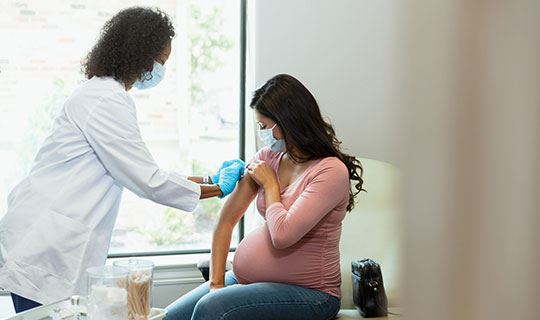Maternal Immunization
Pregnancy and the COVID Vaccine, Flu Shots and Other Vaccinations
 Vaccinations are an important way to keep you and your baby safe from harmful
illnesses. Below are some frequently asked questions about vaccines and
pregnancy.
Vaccinations are an important way to keep you and your baby safe from harmful
illnesses. Below are some frequently asked questions about vaccines and
pregnancy.
Are COVID-19 vaccines safe for pregnant women?
There is no evidence suggesting that COVID-19 vaccines could harm pregnant women or their unborn children. Two of the most well-respected medical societies in our country, the American College of Obstetricians and Gynecologists and the American Society for Reproductive Medicine, have both recommended that pregnant women, women considering pregnancy, lactating moms, and women with infertility problems all receive the COVID-19 vaccine.
Should I get a COVID vaccine if I am pregnant? What about a booster shot?
Yes, get a COVID-19 vaccine, unless you are allergic to its ingredients. Booster shots are also recommended. Pregnant women with COVID-19 are more likely to become seriously ill than their non-pregnant counterparts and are classified as a high-risk group by the Centers for Disease Control and Prevention (CDC). There’s also a chance that pregnant woman with COVID-19 will have a heightened risk of adverse outcomes in pregnancy. Given those factors, it’s important that we use all the tools at our disposal to keep both you and your baby safe. When you consider the significant risks of COVID-19 in pregnancy, it’s clear that the benefits of vaccination outweigh the risks.
Can a COVID-19 vaccine give me COVID-19?
No, the live virus is not part of the COVID-19 vaccines, so you cannot get it from them.
What are the side effects of the COVID-19 vaccines?
COVID-19 vaccines have common side effects, which are considered normal. You may experience redness or tenderness at the injection site, fever, fatigue or muscle aches. These symptoms usually only last about 1 to 3 days.
There is no sign that the side effects for pregnant women are any different than the general population. However, your doctor may advise you to take acetaminophen if you develop a fever after vaccination, as that will help keep you and your child in best health.
Read more frequently asked questions about COVID-19 vaccines.
Should I get the flu shot if I am pregnant?
Pregnant women are strongly encouraged to receive influenza immunization, better known as the flu shot, to protect themselves and their developing babies. This is the recommendation from physicians who are experts in maternal-fetal medicine, as well as obstetrician/gynecologists (OB/GYNs), and immunologists. It is an essential part of pre-pregnancy, prenatal and postpartum care.
The top three reasons you need the flu vaccine during pregnancy as recommended by the Centers for Disease Control and Prevention (CDC) and the American College of Obstetricians and Gynecologists (ACOG) are:
- The flu is a serious illness that can be life-threatening for mother and baby. It is especially important to be vaccinated, because getting the flu is often much more severe in pregnant women, and it can harm the developing baby, as well. Symptoms of the flu vary, but can harm both the mother and fetus. If a pregnant woman does get the flu, there is a higher risk of contracting pneumonia and the need for emergency medical care. A pregnant woman who gets the flu also has a greater chance for premature labor and delivery. The reason why this happens is because there are significant changes in the immune system, heart and lungs that occur during pregnancy that makes a woman more prone to severe illness from the flu.
- The flu shots protects the baby after birth. Infants are not able to be vaccinated as newborns. The flu shot during pregnancy can protect your newborn from getting the flu, until the baby is old enough to get the vaccine directly. If you have already given birth and you are breastfeeding, you can get the flu shot, which will protect the baby as the antibodies the mother forms to protect her from the flu are passed to the infant through her breast milk.
- The flu shot is safe and effective. Both the mother-to-be and her baby benefit from the flu shot, regardless of the trimester of her pregnancy. Also, it’s a myth that the flu shot can cause the flu. Numerous studies have disproven this misconception, including clinical trials and data from safety reporting systems.
Is there a specific flu shot for pregnant women?
Women cannot receive the live attenuated flu vaccine given as an intranasal spray. They can receive the flu vaccine given by injection. However, your flu vaccine should be a licensed, recommended, age-appropriate, inactivated flu shot. There is no specific recommendation for one type of flu shot over another, per the Advisory Committee on Immunization Practices or ACOG. Flu shots are available at most major pharmacies, and you can find a nearby location for the flu shot at www.vaccinefinder.org.

Can the flu shot give me the flu?
No, getting vaccinated for the flu does not give you the flu. This is a
common misconception. You may wonder then, why some people can still get
sick after being vaccinated. The reason why, is the shot does not protect
against all flu virus strains, and the flu shot takes 2 weeks for your
body to develop the necessary antibodies to protect you from getting the
flu. Also, the flu shot is only about 50 to 65 percent effective, as immunologists
and scientists make a new flu vaccine for flu season every year, and the
shots protect those who are immunized against the most common strains.
The
side effects pregnant women can experience from the flu shot are the same as any other person can have, although they are rare. Those
who do experience side effects often report mild symptoms that only last
for 1-2 days. If you have an adverse reaction that you think was caused
by the flu shot, contact your OB/GYN or health care provider right away
for treatment.
Should I be vaccinated for every pregnancy?
Yes. The reason why is because the flu vaccine is only effective for any given flu season, it is not a vaccine like the polio immunization, which lasts a lifetime. Also, flu strains change from year to year, and the shot is reformulated by immunologists and scientists each year.
How effective is the flu shot?
The flu shot is about 50 to 65 percent effective in any given year. The reason why it isn’t 100 percent effective is because every year, scientists and immunologists formulate a new vaccine that only protects against the strains they have identified for that particular flu season. There are many different flu strains. Another reason why some people still get sick is because the flu shot takes 2 weeks to “kick in,” because it takes that long for the mother to develop the antibodies that protect her against the flu.
How does the flu spread?
Flu viruses spread by those who have the flu when they expel droplets while coughing, sneezing, or even talking. When these droplets land on the mouths, noses, or eyes of those nearby, then they can contract the flu from the person who is contagious. If the flu virus can also be contracted by touching a surface that has the flu virus on it. Those who have the flu are contagious and can infect others 1 day before they develop symptoms, and up to 5 to 7 days after they get the flu. The immunocompromised might be able to infect others for even longer than 7 days.
How serious is the flu?
Because the flu is unpredictable in its severity from year to year and even from one person to the next, there are many variables that can determine how ill you can get from contracting the flu. For example, it depends on which strain you are infected with, when the vaccine is made available, how many people get vaccinated (herd immunity), and the effectiveness of the flu shot from year to year. Generally, though, pregnant women experience a much more severe illness, because they experience physiological changes that can make it more difficult to combat the flu.

Is it safe to get the flu shot while I’m breastfeeding?
Yes, it is recommended that you receive the flu shot even if you are breastfeeding if you did not receive the flu shot while you were pregnant. The antibodies the body develops after receiving the flu shot can be passed to the baby via the breastmilk, which also reduces the baby’s chance of contracting the flu.
Is there any reason pregnant women should not get the flu shot?
There are very few reasons. Some believe a history of an egg allergy (including hives) is one of them, but experts have disproven this. The one thing that might prevent you from getting the flu shot includes a severe allergic reaction from a previous flu shot. Ask your OB/GYN about any adverse reactions you’ve had from past flu shots to determine whether you should forego vaccination. Consult with your obstetrician before getting flu vaccine if you have a history of Guillain-Barre syndrome.
What if I get the flu while pregnant?
There is still a chance you could get the flu while pregnant. If you suspect you have the flu, contact your OB/GYN right away. If you have severe symptoms, including a high fever or trouble breathing, seek immediate medical attention. If you have had close contact with someone else who has been infected with the flu, you should contact your OB/GYN or other health care provider.
Should I get the Tdap shot while pregnant?
Yes, you should get the Tdap shot if you are pregnant. The Tdap shot helps prevent three infections: tetanus, diphtheria, and pertussis. The Tdap shot is a safe way to protect you and your baby from complications of pertussis also known as whooping cough, which can have similar symptoms to COVID-19. The Tdap vaccine should preferably be given during the early part of the third trimester.
Where can I learn more about vaccinations and pregnancy?
-
Centers for Disease Control and Prevention
Pregnant Women and COVID-19
Pregnant Women & Influenza (Flu)
Flu Vaccine Safety and Pregnancy -
American College of Obstetricians and Gynecologists
COVID-19 Vaccine Information
Immunization for Women -
Society for Maternal-Fetal Medicine
Vaccines During Pregnancy
Let’s be healthy together. Contact us at RWJBarnabas Health to request a maternity tour at one of our New Jersey hospitals.



